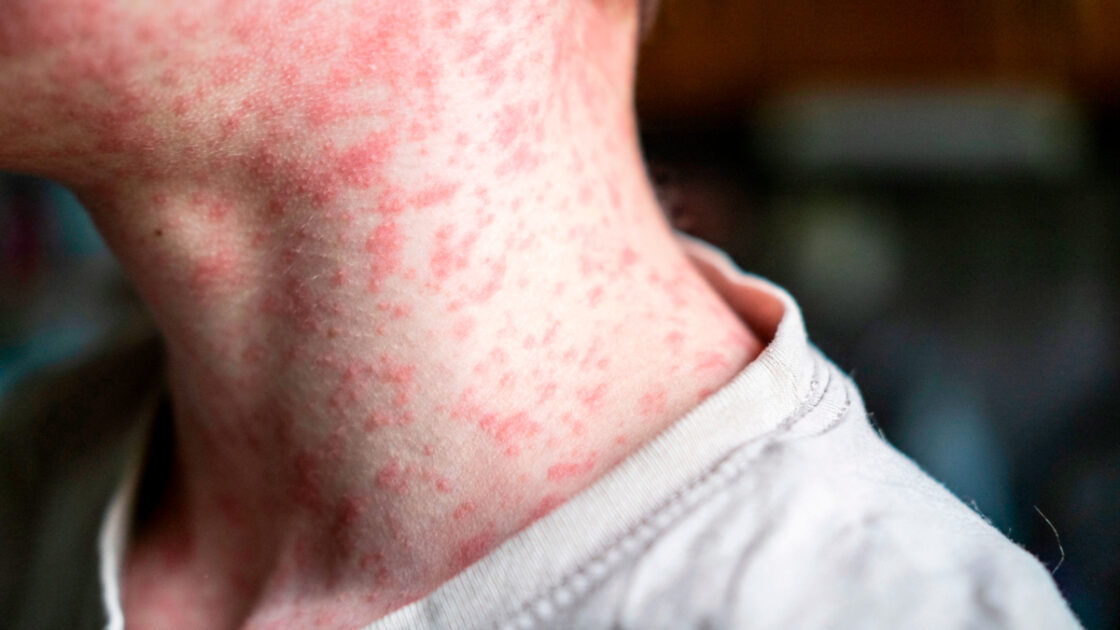Signs and symptoms of measles
It is important to be aware of the signs and symptoms of measles and to seek medical advice if you think you may have the illness

The measles virus can cause serious illness. Though infection rates have reduced since the introduction of childhood vaccines, outbreaks can still happen. It is important to be aware of the signs and symptoms of measles and to seek medical advice if you think you may have the illness.
What is measles?
Measles is an illness that can develop after coming into contact with the measles virus. It is very contagious, so can spread quickly from person to person.
The symptoms of measles
Symptoms typically start around 10 days after a person comes into contact with the virus. It can begin with cold-like symptoms such as:
- Aches and pains
- A runny nose
- Sneezing
- A cough
- Sore, red eyes that may be sensitive to light
- A temperature of 38 degrees Celsius or above (fever)
- Small grey-white spots in your mouth
- Loss of appetite
- Tiredness, irritability and a general lack of energy
A rash often develops a few days after symptoms first appear.
Understanding measles symptoms
Not every person with measles will get small grey-white spots, but the combination of spots with other cold-like symptoms are a strong sign that a person has measles.
A measles rash can begin anywhere but typically starts on the head or neck and then spreads outwards to the rest of the body.
The rash can be flat or slightly raised and join together into large blotchy patches. It looks brown or red on white skin. It may be harder to see on darker skin tones.
Some people find the rash itchy. People with measles often feel the most sick a day or two after developing a rash.
Measles complications
Most people who develop measles do not develop complications, but they can happen. Some issues that can be caused by measles include:
- Diarrhoea and vomiting
- A middle ear infection
- Conjunctivitis (eye infection)
- Inflammation of your voice box (laryngitis)
- Infections of your airways and lungs, such as pneumonia
If measles spreads to the lungs or brain, it can cause more serious issues. Rare problems that can be caused by measles include:
- Inflammation of your liver (hepatitis)
- Eye disorders and vision loss
- Meningitis
- A brain infection
- Heart and nervous system problems
Babies, children with poor diets and people with weakened immune systems are more likely to develop serious complications from measles.
Measles in pregnancy
If you get measles when you’re pregnant, and you’re not immune to it, it could harm the foetus. It can cause:
- Miscarriage or stillbirth
- Premature birth
- Low birth weight
What to do if you think you have measles
You are unlikely to have measles if you have had two doses of the MMR vaccine or have had measles in the past.
Contact your GP or hospital urgently if you:
- Are pregnant and you think you might have measles
- Were in close contact with someone who has measles and you are pregnant
- Were in close contact with someone who has measles and you did not have measles in the past or 2 doses of the MMR vaccine
It is important to call before you go to your GP or hospital, as they may need to make arrangements to reduce the risk of spreading the infection.
Treating measles at home
Measles is caused by a virus, so antibiotics cannot treat it. Antibiotics may be required to treat secondary bacterial infections that people can develop after getting measles, such as ear infections.
If you believe you have measles, but the above bullet points do not apply to you, these tips can help to ease symptoms:
- Take paracetamol or ibuprofen for the fever, aches and pains
- Drink plenty of fluids to avoid dehydration
- Close the curtains to lower your sensitivity to light
To prevent the spread of infection, do not attend work or school if you have measles or if you think you have measles. Avoid contact with children, people with weakened immune systems and pregnant people if you think you have measles.
When to seek emergency care
Call 999, or go to the nearest emergency department, if you have measles and develop the following symptoms:
- Shortness of breath
- A sharp chest pain that feels worse with breathing
- Cough up blood
- Drowsiness
- Confusion
- Fits (convulsions)
Tell the 999 operator you have measles, or call the hospital before going to the emergency department. This allows medical staff to make arrangements to reduce the risk of the measles infection spreading to others.
Measles vaccination
The best protection against the measles infection is vaccination. The MMR vaccine is free, safe and effective.
Measles vaccination offers the best protection against serious illness. One dose of the MMR vaccine is 93% effective at preventing measles.
If you did not get vaccinated for measles as a child, there are chances to get the vaccine as an adult. You can consult your GP if you are unsure whether you got the measles vaccine as a child. The HSE can also facilitate MMR vaccination.






